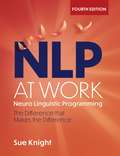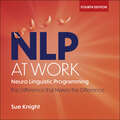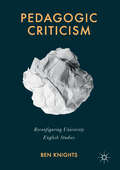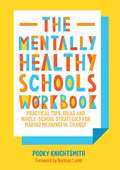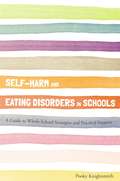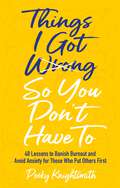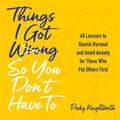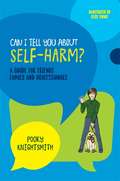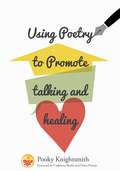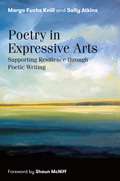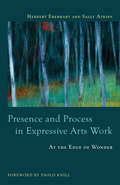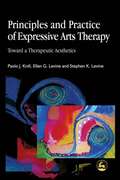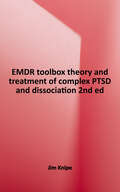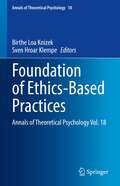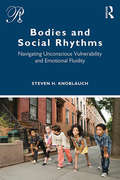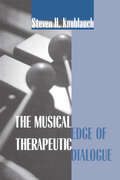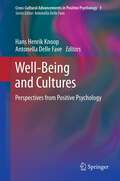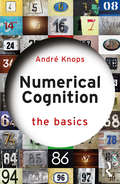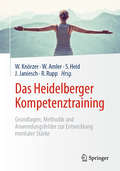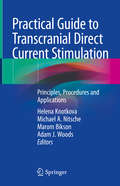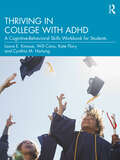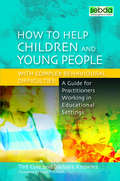- Table View
- List View
NLP at Work: The Difference that Makes the Difference
by Sue Knight'This book may help you to understand life more clearly' Paul Smith, fashion designerWelcome to THE book on NLP. The essence of NLP is the ability to study and reproduce excellence in yourself and to support others to do the same. NLP AT WORK helps you do that by developing an attitude of curiosity, naivety and learning - and giving you the ability to improvise with skill in real-time. Neuro Linguistic Programming is how you make sense of your world and, most importantly, how you make it what you want it to be: * Neuro: the way you filter and process your experience through your senses. * Linguistic: the way you interpret your experience through language. * Programming: the way you make sense of your experience to create your personal programme. NLP AT WORK is one of the most popular books ever published on the practical skills of NLP and how it can be applied in business. It transformed NLP from a peripheral art into an accessible, practical concept with relevant applications in the areas of influence, communication, negotiation, teamwork and coaching. This major new edition has been revised throughout and expanded to include a new section on coaching with NLP, showing how this approach is so different to traditional methods, and a new chapter on Metamessages. Clear, readable and jargon free, this book will help you get to the essence of what makes you and your business excellent and unique.
NLP at Work: 4th Edition: The Difference that Makes the Difference
by Sue Knight'This book may help you to understand life more clearly' Paul Smith, fashion designerWelcome to THE book on NLP. The essence of NLP is the ability to study and reproduce excellence in yourself and to support others to do the same. NLP AT WORK helps you do that by developing an attitude of curiosity, naivety and learning - and giving you the ability to improvise with skill in real-time. Neuro Linguistic Programming is how you make sense of your world and, most importantly, how you make it what you want it to be: * Neuro: the way you filter and process your experience through your senses. * Linguistic: the way you interpret your experience through language. * Programming: the way you make sense of your experience to create your personal programme. NLP AT WORK is one of the most popular books ever published on the practical skills of NLP and how it can be applied in business. It transformed NLP from a peripheral art into an accessible, practical concept with relevant applications in the areas of influence, communication, negotiation, teamwork and coaching. Clear, readable and jargon free, this book will help you get to the essence of what makes you and your business excellent and unique.(P) 2020 Hodder & Stoughton Ltd
Pedagogic Criticism
by Ben KnightsThis book argues that the history of English Studies is embedded in its classroom practice, and its practice in its history. Some of its foundational struggles are still being lived out today. English is characterized as a 'boundary' subject, active in dialogue across a number of imagined borders, especially those between academic and non-specialized readerships. While the subject discipline maintains strong pedagogic principles, many of its principles and values are obscure or even invisible to students and potential students. The book cross-fertilizes the study of English as a subject with the analysis of selected literary texts read as pedagogic parables. It concludes with a call for a return to the subject's pedagogic roots.
The Mentally Healthy Schools Workbook: Practical Tips, Ideas, Action Plans and Worksheets for Making Meaningful Change
by Pooky KnightsmithThis book is the perfect starting point for anyone looking to promote and encourage mental health in their school, or evaluate their existing provision, in line with current government priorities. It covers not only the day-to-day practical steps you can take to meet the mental health needs of learners, but also a provides a whole bank of ideas for ensuring you adopt a whole-school approach to positive mental health. Pooky Knightsmith lays out tried and tested tools you can use to evaluate the overall mental health of a school, showing how to improve and support the mental health of staff, and how to ensure that the voice of every learner is heard and valued, including the most vulnerable - and that everyone involved with the school feels safe, healthy and happy. Pooky's simple 'litmus test' framework lays out six practical areas you can explore to implement change within your own school, with explanations, sheets to fill in, tips from loads of school staff, and case examples that break these ideas down into easily digestible chunks. This much-needed book is a jumping off point for meaningful change in all aspects of your school community that will promote, support and strengthen mental health at whole-school level.
Self-Harm and Eating Disorders in Schools: A Guide to Whole-School Strategies and Practical Support
by Pooky KnightsmithSelf-harm and eating disorders are present in almost every school and they frequently co-occur. This book provides the vital guidance that school staff need to spot early warning signs, understand triggers and support the students in their care effectively.This very practical guide helps educational professionals to gain a better understanding of self-harm and eating disorders by dispelling the myths and misconceptions that surround these behaviours. The book provides advice on whole-school policies and procedures as well as day-to-day strategies to implement in lessons, at mealtimes and in one-on-one sessions. It explains how to respond to disclosures, make referrals and work alongside parents to assist in the road to recovery.
Things I Got Wrong So You Don't Have To: 48 Lessons to Banish Burnout and Avoid Anxiety for Those Who Put Others First
by Pooky KnightsmithAn internationally respected campaigner, Pooky Knightsmith has worked tirelessly to promote good child and adolescent mental health. Her knowledge, ideas and advice come not just from years of research and study, but from hard earned experience with PTSD, anorexia, self-harm and depression.Part mental health guide, part memoir, this book contains 48 life lessons learned from everyday victories to life-changing events. Pooky shares tips on how to avoid burnout, how small acts of self-care can make a big difference, steps you can take to live with anxiety, and how to nurture key friendships and relationships, amongst many other things. Each lesson ends with space for the reader to reflect, and includes exercises to help take the first steps to incorporating these lessons into their own lives.Unflinching and utterly authentic, Pooky shares the things she got wrong so that you don't have to.
Things I Got Wrong So You Don't Have To: 48 Lessons to Banish Burnout and Avoid Anxiety for Those Who Put Others First
by Pooky KnightsmithAn internationally respected campaigner, Pooky Knightsmith has worked tirelessly to promote good child and adolescent mental health. Her knowledge, ideas and advice come not just from years of research and study, but from hard earned experience with PTSD, anorexia, self-harm and depression.Part mental health guide, part memoir, this audiobook contains 48 life lessons learned from everyday victories to life-changing events. Pooky shares tips on how to avoid burnout, how small acts of self-care can make a big difference, steps you can take to live with anxiety, and how to nurture key friendships and relationships, amongst many other things. Each lesson ends with space for the listener to reflect, and includes exercises to help take the first steps to incorporating these lessons into their own lives.Unflinching and utterly authentic, Pooky shares the things she got wrong so that you don't have to.(P) 2022 Jessica Kingsley Publishers
Self-Harm and Eating Disorders in Schools: A Guide to Whole-School Strategies and Practical Support
by Pooky Knightsmith Sarah BrennanSelf-harm and eating disorders are present in almost every school and they frequently co-occur. This book provides the vital guidance that school staff need to spot early warning signs, understand triggers and support the students in their care effectively. This very practical guide helps educational professionals to gain a better understanding of self-harm and eating disorders by dispelling the myths and misconceptions that surround these behaviours. The book provides advice on whole-school policies and procedures as well as day-to-day strategies to implement in lessons, at mealtimes and in one-on-one sessions. It explains how to respond to disclosures, make referrals and work alongside parents to assist in the road to recovery.
Can I Tell You About Self-Harm?: A Guide for Friends, Family and Professionals
by Pooky Knightsmith Elise Evans Jonathan SingerMeet Asher - a teenager who self-harms to manage their feelings when it all feels like too much. The latest in the best-selling Can I Tell You About... series describes what self-harm is, along with the wide range of behaviours that qualify, why teens do it, and how to get help if you feel the need to self-harm. Reflecting on the different aspects of self-harming behaviour, including treatment of injuries and scars, this concise introduction dispels common myths and offers helpful resources to break the cycle of self-harm. By initiating the conversation around self-harm, this guide will offer alternative avenues for children and young adults to pursue when dealing with big feelings, such as professional counselling, distraction, and friends and family. This easy-to-read guide is suitable for readers 7+, along with their parents, teachers, and friends. All author royalties from the book will go towards the Charlie Waller Memorial Trust.
Using Poetry to Promote Talking and Healing
by Pooky Knightsmith Catherine Roche Dr Fiona PienaarPoetry can prove a great way into difficult conversations in therapeutic, classroom or family settings. This book is a clear and practical guide to the use of poetry as a therapeutic tool to help explore issues surrounding mental health and emotional wellbeing. The first part of the book provides guidance on different methods of using poetry to open up discussion. The second part consists of a collection of over 100 poems written by the author, on topics such as bullying, anxiety, bereavement, depression and eating disorders, with a range of therapeutic activities that can be used alongside each poem. The third part focuses on ways to support and encourage clients to write their own poetry and includes 50 poem writing prompts and examples. A complete resource for anyone considering using poetry to explore difficult issues, and a creative way of exploring important mental health issues in PSHE lessons, this book will be of interest to youth, school and adult counsellors, therapists, psychologists, pastoral care teams, PSHE co-ordinators and life coaches, as well as parents.
Poetry in Expressive Arts: Supporting Resilience through Poetic Writing
by Margo Fuchs Knill Sally AtkinsPoetry is increasingly used in therapy, and it already occupies a central place in expressive arts therapies. This book is the first to explicitly combine theory and practice from the field of expressive arts with poetry and poetics.The book offers both a guide and poetic encouragement for using poetry in expressive arts work. Within this arts context, poetry is offered as a way to create hope and confidence, providing clients with a platform for healing, reconciliation, problem solving, and personal and professional development. Each chapter uses examples of poetry to illustrate the ideas of the chapter.With an outstanding contribution to the field of expressive arts theory and practice, this book is essential for people wanting to use an integrative arts-based approach to help their clients build resilience and foster sustainable, positive change in their lives.
Presence and Process in Expressive Arts Work: At the Edge of Wonder
by Paolo Knill Sally Atkins Herbert EberhartWhat are the basic attitudes, values, and practices that are essential for effective work with the expressive arts? This book explores the answer to that question. The authors examine in depth the concepts of 'presence' - a way of 'being' - and 'process' - an open and trusting way of working - in the professional helping relationship and in the making of art. They introduce readers to the premise of the 'uniqueness of persons' that underpins these ideas, and look at how to realize them in practice. Diverse experiences are also shared of using the arts in group and individual work in a variety of settings, from team building and education to counseling, psychotherapy and supervision. This book is a comprehensive, foundational guide for all practitioners who use the expressive arts as a way of facilitating learning, growth, healing, and change, including expressive arts therapists and students, counsellors, coaches, and other helping professionals. With its clear structure and straight forward style, the book is appropriate also for beginners in these professional fields.
Principles and Practice of Expressive Arts Therapy: Toward a Therapeutic Aesthetics
by Paolo Knill Ellen Levine Stephen K LevineChallenging traditional therapeutic approaches to the arts in which art is often secondary to a psychological model, Principles and Practice of Expressive Arts Therapy provides a coherent theoretical framework for an expressive arts therapy practice that places the process of art-making and the art work itself at the center. This book lays the philosophical foundation for a fresh interpretation of art-making and the therapeutic process by re-examining the concept of poiesis. The authors clarify the methodology and theory of practice with a focus on intermodal therapy, crystallization theory and polyaesthetics, and give guidance on the didactics of acquiring practical skills. Case studies of clinical practice and guidance on supervision and training in intermodal expressive arts therapy complement the theoretical chapters. Combining philosophy, theory and practice, this book is an essential text for students and academics in the field and for practicing expressive and specialized arts therapists.
EMDR Toolbox: Theory and Treatment of Complex PTSD and Dissociation
by Jim KnipeThis innovative resource for therapists trained in Standard EMDR delivers a powerful set of EMDR-based “Tools” - useful strategies for helping difficult-to-treat clients with complex emotional problems. The second edition reflects the author’s ongoing efforts to design treatments that can significantly extend the therapeutic power of methods based on an Adaptive Information Processing model. It describes new discoveries that promote effective ways of structuring therapy sessions and refines original treatment procedures that can facilitate and safely accelerate therapeutic progress. <p><p>EMDR Toolbox provides an overview of the principal issues in treating these complex emotional problems and describes highly effective methodologies with a wide variety of clinical presentations that originate in or include disturbing traumatic memories. It also describes how to integrate specific EMDR-related interventions with other psychotherapeutic treatments. Each intervention is examined in detail with accompanying transcripts, client drawings, and case studies illustrating the nuances and variations in intervention application. Bolstered by supporting theory and current research, this EMDR book also discusses how the concepts and vocabulary of other models of dissociation translate directly into EMDR's Adaptive Information Processing (AIP) language. <p><p>New to the Second Edition: <p>•Describes new strategies and refinements of standard methods for treatment of clients with complex emotional problems <p>•Includes two completely new chapters, “Internal Healing Dialogue” and “Case Example: treating the problem of ‘attachment to the perpetrator’” <p>•Provides new case examples on childhood sexual abuse <p>•Offers new sections on treating chronic defensive shame, the importance of “fast” vs “slow” thinking processes, and new applications of “Loving Eyes” procedures <p><p>Key Features: <p>•Written by an EMDRIA-designated “Master Clinician” <p>•Delivers successful treatments alternatives for difficult-to-treat clients <p>•Provides a theoretical framework to guide assessment and treatment of clients with complex PTSD <p>•Includes specific AIP tools, verbatim therapy scripts, client drawings, and case studies <p>•Discusses each intervention in detail, illustrating the nuances and variation in different applications
Foundation of Ethics-Based Practices: Annals of Theoretical Psychology Vol. 18 (Annals of Theoretical Psychology #18)
by Birthe Loa Knizek Sven Hroar KlempeThis book contrasts earlier textbooks on “evidence-based practices.” Whereas the latter is a slogan that call for scientific evidence to be used in standardized treatment manuals, ethics-based practices call for individualized treatment that makes the situation meaningful for the patient. The main argument for changing the treatment design from being evidence-based to one based on ethics, is the hypothesis that good health care is based on treatment which makes the situation positive and meaningful for the patient. The awareness for this is primarily provided by ethical considerations.
Bodies and Social Rhythms: Navigating Unconscious Vulnerability and Emotional Fluidity (Psychoanalysis in a New Key Book Series)
by Steven KnoblauchThis exciting new book traces the development of an unfolding challenge for psychoanalytic attention, which augments contemporary theoretical lenses focusing on structures of meaning, with an accompanying registration different than and interacting with structural experience. This accompanying registration of experience is given the term ‘fluidity’ in order to characterize it as too fast moving and unformulated to be symbolized with linguistic categorization. Expanding attention from speech meaning to include embodied registrations of rhythm involving tonality, pauses and accents can catalyze additional and often emotionally more significant communications central to the state of the transactional field in any psychoanalytic moment. This perspective is contextualized within recognition of how cultural practices and beliefs are carried along both structural and fluid registrations of experience and can shape emotional turbulence for both interactants in a clinical encounter. Experiences of gender, culture, class and race emerging as sources of conflict and mis-recognition are engaged and illustrated throughout the text. This book, part of the popular "Psychoanalysis in a New Key" book series, will appeal to teaching and practicing psychoanalysts, but also an increasing volume of therapists attending to embodied experience in their practice and drawn to the practical clinical illustrations.
The Musical Edge of Therapeutic Dialogue
by Steven H. KnoblauchSuch nuances and shifts in the music of a patient's voice have long been familiar to clinicians. Indeed, as Steven Knoblauch observes, the music of psychotherapy has been acknowledged across a variety of theoretical orientations, from Freudian to self-psychological to interpersonal and relational perspectives. In The Musical Edge of Therapeutic Dialogue, Knoblauch provides a model of "resonant minding" in which the musical elements of speech become a major source of information about unconscious communication and action. More specifically, resonant minding, by distinguishing between discrete and continuous levels of communication, between the verbal and the musical, offers a way of accessing and affecting levels of unconscious interactive process by attending to the musical edge of dialogue -- provided only that we can hear it. Drawing on detailed clinical vignettes, he explores shifts in embodied dimensions of musical expression including rhythm, tone, pauses and accents across a sequence of patient-therapist interactions in order to show how the dyadic logic of mutual improvisation operates at the periphery to guide the continuous flow of unconscious communication and mutual regulation. In so doing, Knoblauch provides a vivid sense of how the shifting movement of the patient's "solo performance" can be facilitated and enriched by the creative "accompaniment" of the therapist.Ultimately, Knoblauch argues, the music of therapy is not only another road to the unconscious, but one uniquely able to convey emergent meanings in a variety of domains, from conflicting cultural identifications to the experience of the body to the emergence of desire. His vision of mutual immersion in a shared "performance" aimed at fostering growth coalesces into a major contribution - at once evocative and clinically consequential - to the current movement to grasp nonverbal behavior and processes of mutual regulation as they enter into all effective psychotherapy.
Well-Being and Cultures
by Hans Henrik Knoop Antonella Delle FaveThis anthology focuses on empirical studies comparing cultures in relation to central positive psychological topics. The book starts out with an introductory chapter that brings together the main ideas and findings within an integrative perspective, based on a broad theoretical framework encompassing interdisciplinary and methodological issues. It gives special emphasis to some open issues in the theory and assessment of culture-related dimensions, and to the potential of positive psychology in addressing them. The introductory chapter is followed by two chapters that examine theoretical approaches and instruments developed to assess happiness and well-being across cultures. Following that examination, five chapters are devoted to the relationship between well-being, cultures and values. The second half of the book prominently investigates well-being across cultures in the light of socio-economic factors. This book shows that positive psychology, now officially well into its second decade, is providing still finer-grained perspectives on the diversity of cultures along with insights about our shared human nature, uniting us for better or worse.
Erfolgreich abnehmen und schlank bleiben: Nachhaltige Gewichtsreduktion wissenschaftlich belegt
by Uwe KnopDieses Sachbuch möchte allen eine ehrliche Unterstützung bieten, die ernsthaft abnehmen und ihr neues Wunschgewicht auch langfristig halten möchten. Denn: Es ist unbestritten, dass viele Frauen und Männer abnehmen wollen, und sie machen Diäten. So werden jedes Jahr aufs Neue viele Abnehmwillige mit falschen Versprechungen zur neuen„besten Diät“ hinters Licht geführt. Dieses Sachbuch geht erstmals einen anderen Weg: I DIET MY WAY - ist das neue Konzept für alle, die ihren individuellen Weg des Abnehmens maßgeschneidert bis zu ihrem persönlichen Wohlfühlgewicht gehen möchten – und anschließend dabei bleiben wollen. In diesem Buch finden Sie alles zum Thema "Kilos verlieren", was Sie wissen müssen, um langfristig abzunehmen und Ihr Wunschgewicht auch zu halten. Dabei basieren die Erkenntnisse und Empfehlungen vom Autor Uwe Knop auf den aktuellen Erkenntnissen und dem derzeitigen Konsens der WissenschaftLeicht verdaulich und unterhaltsam erfahren Sie in diesem Buch: Abnehmen ist möglich.Das Diätprinzip ist bei allen Diäten immer gleich.Das reduzierte Gewicht zu halten, ist die „hohe Kunst“. JoJo-Effekt & Co: Risiken, die Ihr Gewicht ins Schwanken bringenPraxistipps, wie Sie starten und dran bleiben Sie möchten erfolgreich abnehmen und dauerhaft schlank bleiben? Dann lesen Sie dieses Buch.
Numerical Cognition (The Basics)
by Andre KnopsNumerical Cognition: The Basics provides an understanding of the neural and cognitive mechanisms that enable us to perceive, process, and memorize numerical information. Starting from basic numerical competencies that humans share with other species, the book explores the mental coding of numbers and their neural representation. It explains the strategies of mental calculation, their pitfalls and their development, as well as the developmental steps children make while learning about numbers. The book gradually builds our understanding of the underlying mental processes of numeracy and concludes with an insightful examination of the diagnosis, etiology and treatment of dyscalculia. Written in an accessible manner, the book summarizes and critically evaluates the major psychological explanations for various empirical phenomena in numerical cognition. Containing a wealth of student-friendly features including end of chapter summaries, informative figures, further reading lists, and links to relevant websites, Numerical Cognition: The Basics is an essential starting point for anybody new to the field.
Das Heidelberger Kompetenztraining: Grundlagen, Methodik und Anwendungsfelder zur Entwicklung mentaler Stärke
by Wolfgang Knörzer Wolfgang Amler Sarah Heid Julia Janiesch Robert RuppWie kann man Menschen dazu befähigen, komplexe Anforderungssituationen zu bewältigen und ihre optimalen Leistungen punktgenau abzurufen? Das Heidelberger Kompetenztraining zur Entwicklung mentaler Stärke (HKT) ist genau auf diese Fragestellung hin entwickelt worden. Es führt persönlichkeitsstärkende Lehr- und Lernmethoden mit Mentaltraining im Sport zusammen. In diesem Buch werden sowohl die theoretischen Grundlagen und Methoden als auch Anwendungsfelder und die Implementierung beschrieben. Es richtet sich damit an alle, die Problemlösungskompetenzen stärken und andere Menschen dabei unterstützen möchten.
Practical Guide to Transcranial Direct Current Stimulation: Principles, Procedures and Applications
by Helena Knotkova Michael A. Nitsche Marom Bikson Adam J. WoodsThis book provides a comprehensive overview on Transcranial Direct Current Stimulation (tDCS) and the clinical applications of this promising technique. Separated into three parts, the book begins with basic principles, mechanisms and approaches of tDCS. This is followed by a step-by-step practicum, methodological considerations and ethics and professional conduct pertaining to this novel technique. Chapters are authored by renowned experts who also direct and plan tDCS educational events worldwide. Bridging the existing gap in instructional materials for tDCS while addressing growing interest in education in this field, professionals within a broad range of medical disciplines will find this text to be an invaluable guide.
Polar Expeditions: Discovering Rituals of Success within Hazardous Ventures
by J. David KnottnerusPolar Expeditions employs structural ritualization theory to show how rituals enriched the lives of crewmembers on 19 polar expeditions over a 100-year period. J. David Knottnerus identifies and compares failed, successful, and extremely successful missions in terms of participation in ritual practices and the social psychological health of crews, finding that that social and personal rituals, such as work practices, religious activities, games, birthday parties, special dinners, or taking walks are extremely important in increasing crewmembers' ability to cope with the challenges they face including extreme dangers, isolation, restricted environment, stress, lengthy journeys, and quite importantly the disruption of those practices that define our everyday lives. Besides contributing to our knowledge about polar expeditions, this research yields implications for our understanding of ritual dynamics in other situations such as disasters, refugee camps, nursing homes, traumatic experiences, and a new type of hazardous venture, space exploration.
Thriving in College with ADHD: A Cognitive-Behavioral Skills Workbook for Students
by Laura E. Knouse Will Canu Kate Flory Cynthia M. HartungDeveloped by four professors who also happen to be ADHD experts, this interactive and customizable workbook provides coaching to students with ADHD to make skills like managing time, motivating and organizing oneself, and "adulting" a workable part of everyday college life. Other books for college students with ADHD only describe personal experiences or just give advice, but this workbook promotes learning through interactive exercises and behavioral practice. It will allow you to address issues most relevant to your needs at whatever pace feels right. Modules are designed to be engaging, digestible, and activity-oriented. With practice, you will come away with improved skills that will help you to succeed in college, and to live your best life. This workbook can be used on its own; however, an accompanying Thriving in College guide for therapists uses an approach that mirrors what you will be learning and doing. If you have this workbook and are getting support from a therapist, encourage them to use the therapist guide along with you! Parents can also benefit from information in this workbook, to help their college students along the way and to understand ADHD and how it impacts the college years.
